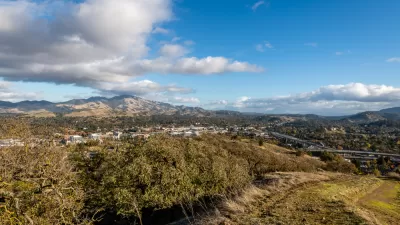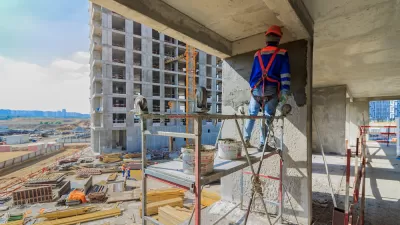Details of the "Sue the Suburbs" movement wielding a new legal tool to counteract the traditionally obstructionist methods of land use regulation in California.

It's impossible to talk about development opponents (sometimes referred to as NIMBYs) in California without mentioning the California Environmental Quality Act (something referred to as CEQA, for short). Now pro-development forces (sometimes referred to as YIMBYs) have their own legal tool to influence local housing policy and planning.
Marissa Kendall details the political actions of an organization called the California Renters Legal Advocacy and Education Fund (CaRLA) in pushing for more housing in the state.
The four-person California Renters Legal Advocacy and Education Fund, or CaRLA, has one reason for being — to sue cities that reject housing projects without a valid reason. The litigious nonprofit with YIMBY roots struck again last month, suing Los Altos after the city rejected a developer’s bid to streamline a project of 15 apartments plus ground-floor office space.
Previous lawsuits by CaRLA have challenged planning decisions and policies in the cities of San Mateo, San Francisco, Lafayette, and Los Altos, among others. Four of the nice cities sued by CaRLA have settled and approved more housing. The organization has also thrown its support behind the failed SB 50 and sponsored SB 167, the Housing Accountability Act, which aims to limit the denial of housing projects that meet all necessary local laws (more on that later).
As an example of CaRLA's work, Kendall cites the example from Los Altos:
In late July, Trauss’ group sued Los Altos over the city’s ruling that a residential and office project proposed on North Main Street did not qualify for streamlined approval under the state’s new SB 35 law. That law requires cities to expedite approval of certain residential and mixed-use projects. The city said the project didn’t have enough residential space to qualify under the law, among other issues, but the lawsuit takes issue with how that calculation was reached.
Kendall explains that CaRLA founder Sonja Trauss builds cases on the precedent set by the aforementioned Housing Accountability Act. Trauss also credits development opponents, infamously using the California Environmental Quality Act as a roadblock for development projects of all kinds, modeling the behavior of litigating development.
FULL STORY: ‘Sue the suburbs’ group strikes again, attacking another Bay Area city over housing

Study: Maui’s Plan to Convert Vacation Rentals to Long-Term Housing Could Cause Nearly $1 Billion Economic Loss
The plan would reduce visitor accommodation by 25,% resulting in 1,900 jobs lost.

North Texas Transit Leaders Tout Benefits of TOD for Growing Region
At a summit focused on transit-oriented development, policymakers discussed how North Texas’ expanded light rail system can serve as a tool for economic growth.

Why Should We Subsidize Public Transportation?
Many public transit agencies face financial stress due to rising costs, declining fare revenue, and declining subsidies. Transit advocates must provide a strong business case for increasing public transit funding.

How to Make US Trains Faster
Changes to boarding platforms and a switch to electric trains could improve U.S. passenger rail service without the added cost of high-speed rail.

Columbia’s Revitalized ‘Loop’ Is a Hub for Local Entrepreneurs
A focus on small businesses is helping a commercial corridor in Columbia, Missouri thrive.

Invasive Insect Threatens Minnesota’s Ash Forests
The Emerald Ash Borer is a rapidly spreading invasive pest threatening Minnesota’s ash trees, and homeowners are encouraged to plant diverse replacement species, avoid moving ash firewood, and monitor for signs of infestation.
Urban Design for Planners 1: Software Tools
This six-course series explores essential urban design concepts using open source software and equips planners with the tools they need to participate fully in the urban design process.
Planning for Universal Design
Learn the tools for implementing Universal Design in planning regulations.
City of Santa Clarita
Ascent Environmental
Institute for Housing and Urban Development Studies (IHS)
City of Grandview
Harvard GSD Executive Education
Toledo-Lucas County Plan Commissions
Salt Lake City
NYU Wagner Graduate School of Public Service





























